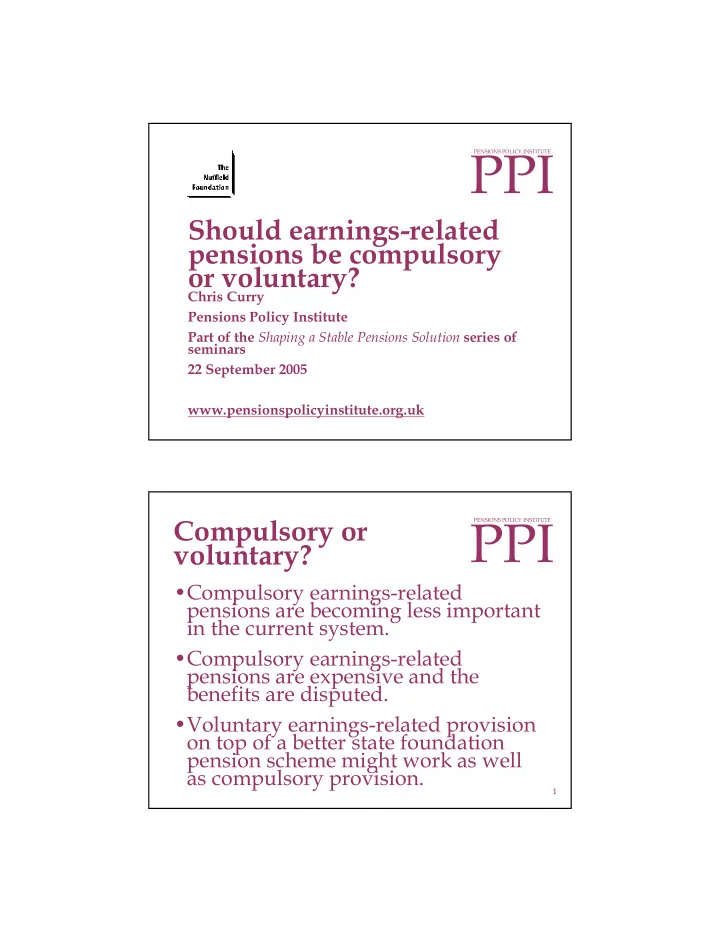

PPI PENSIONS POLICY INSTITUTE Should earnings-related pensions be compulsory or voluntary? Chris Curry Pensions Policy Institute Part of the Shaping a Stable Pensions Solution series of seminars 22 September 2005 www.pensionspolicyinstitute.org.uk PPI Compulsory or PENSIONS POLICY INSTITUTE voluntary? •Compulsory earnings-related pensions are becoming less important in the current system. •Compulsory earnings-related pensions are expensive and the benefits are disputed. •Voluntary earnings-related provision on top of a better state foundation pension scheme might work as well as compulsory provision. 1
S2P takes time to improve PPI PENSIONS POLICY INSTITUTE pensions at low income levels Pension entitlement on reaching SPA in 2024/5 as a proportion of NAE by constant annual earnings in 2005/6 earnings terms Additional 35% available from S2P 30% 25% Amount that would have 20% been delivered by SERPS had it 15% continued 10% BSP 5% 0% - 5,000 10,000 15,000 20,000 25,000 30,000 35,000 40,000 2 State pensions will be less PPI PENSIONS POLICY INSTITUTE earnings-related in future Pension entitlement on reaching SPA in 2054/5 as a proportion of NAE by constant annual earnings in 2005/6 earnings terms 35% 30% Additional 25% available from S2P 20% Amount that would have 15% been delivered by 10% SERPS had it continued 5% BSP 0% - 5,000 10,000 15,000 20,000 25,000 30,000 35,000 40,000 3
PPI PENSIONS POLICY INSTITUTE What should the role of the state be? 1. Alleviation of poverty Broadly accepted 2. Prevention of poverty 3. Belonging and participation in the community In debate 4. Continuance of economic status 4 Compulsory PPI PENSIONS POLICY INSTITUTE earnings-related provision could: •Minimise the risk of future disappointment. •Save the state money. •Encourage growth in the voluntary private pension sector. •Provide a positive effect on the economy, along with a clear incentive to work. •Maintain the status quo and avoid disrupting the existing pension provision framework. 5
State pension reform PPI PENSIONS POLICY INSTITUTE is likely to be expensive Estimated illustrative cost in 2040 of alternative state pension systems % GDP in 2040 Current system 6.5% Flat-rate pension of £109 a week uprated in 9.5% line with earnings and an earnings-related pension Simple flat-rate pension of £109 a week 8.2% uprated in line with earnings Flat-rate pension of £90 a week uprated in line 8.3% with earnings and an earnings-related pension 6 A higher flat-rate pension is PPI PENSIONS POLICY INSTITUTE better for lower earners Pension entitlement on reaching SPA in 2053/4 as a proportion of NAE by constant annual earnings in 2005/6 earnings terms, working for 40 years B: Earnings- 30% related pension 25% Universal 20% pension of £109 a week at the 15% same cost as A+B 10% A: Universal pension of 5% £90 a week 0% - 6,000 12,000 18,000 24,000 30,000 36,000 7
A higher flat-rate PPI pension means less PENSIONS POLICY INSTITUTE means-testing Illustrative number of pensioners entitled to Pension Credit in 2040 Number (proportion) of pensioners on PC in 2040 Current system 13 million (75%) Flat-rate pension of £109 a week uprated in 0.5 million (5%) line with earnings and an earnings-related pension Simple flat-rate pension of £109 a week 1 million (5%) uprated in line with earnings Flat-rate pension of £90 a week uprated in 3 million (20%) line with earnings and an earnings-related pension 8 PPI PENSIONS POLICY INSTITUTE What should the role of the state be? Could undermine 1. Alleviation of poverty here 2. Prevention of poverty 3. Belonging and participation in the community 4. Continuance of economic status If do too much here 9
Some think PPI PENSIONS POLICY INSTITUTE compulsory earnings- related provision: •Is unable to guarantee an adequate pension income. •Could increase the need for means-testing and other Government costs. •Could undermine voluntary private saving through added complexity, increased regulation and consequently higher costs. •Would not have a significant impact on the economy. 10 Spectrum of options for PPI PENSIONS POLICY INSTITUTE state involvement in earnings-related pension provision Do Nothing Deliver Inform Compel Incentivise Enable 11
PPI Questions for PENSIONS POLICY INSTITUTE discussion • Can the state afford to provide both poverty prevention and earnings-replacement? • Is it more important for the state to prevent poverty for all, or is there an ‘acceptable’ level of poverty consistent with giving more resources to earnings-replacement? • Would voluntary saving for earnings- replacement be easier with or without a compulsory earnings-replacement scheme? • Could a revitalised voluntary system be good enough to improve upon the existing compulsory system? 12
Recommend
More recommend